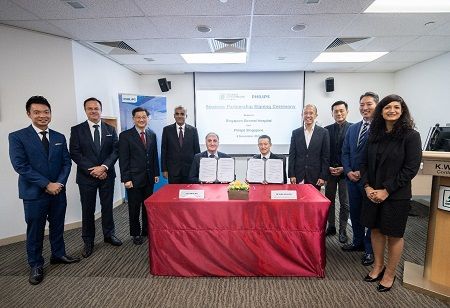Royal Philips, a global leader in health technology, has announced a strategic partnership with Singapore General Hospital (SGH) to establish a pioneering Magnetic Resonance Imaging (MRI) Training Centre in Singapore. The centre, opening on December 9, 2024, is aimed at furthering SGH's efforts in advancing medical imaging education and capabilities. It will be open to public and private hospitals across Singapore and the Asia Pacific (APAC) region. This process constitutes some landmark advancement in standards of healthcare through innovative MRI training.
With 71% of healthcare leaders in APAC concerned about staff shortages resulting in delays in care for patients [1], digital health technologies become increasingly vital in helping people get the care they need when they need it, by streamlining workflows and seamlessly connecting data end-to-end to bring the most clinically valuable and patient-centric insights to care teams. And training and education are key components in supporting digital upskilling and continuous learning as technology advances.
"We have a long-standing relationship with Singapore General Hospital. We are excited to expand our partnership and play a part in elevating the diagnostic standards and capabilities in Singapore and Asia Pacific," says Dr. Mark Burby, Vice President of Health Systems, Philips APAC. "This collaboration aligns with Philips' vision of delivering better care for more people by raising the standards of care delivery. It is also part of our steady commitment to strategically work together with key health system stakeholders to improve the adoption and deepen the understanding of the latest imaging innovations in radiology".
As part of the collaboration, two SGH MRI radiographers will undergo Philips Clinical Application Training using a Train-the-Trainer approach. This is Philips' signature training program typically for its application specialists. The extensive training program will equip and empower SGH radiographers to then share the latest and in-depth expertise in MR clinical practice with others.
"Our commitment to equipping colleagues with the latest technological advancements and knowledge is reinforced through our collaboration with Philips. It enables us to enhance our capabilities in managing increasingly complex patient conditions, which is crucial in today's healthcare landscape. Moreover, the partnership has the potential to yield positive outcomes not only for Singapore General Hospital but also for healthcare providers across the Asia-Pacific region," says Associate Professor Andrew Tan, Chairman, Division of Radiological Sciences, SGH. "This is a great testament to what can be accomplished when organizations with a shared vision and purpose come together".
An MRI Training Centre will also be set up in SGH as an educational hub for other radiographers from across the APAC region. The room is equipped for SGH to facilitate the upskilling of radiographers with the latest MRI clinical applications and host educational workshops, seminars and trainings across the public or private sectors.
SGH will serve as a key reference site for Singapore and overseas healthcare institutions on best practices, workflows, techniques, real-world operations and clinical experiences around the Philips MR ecosystem and technology. This is a significant benefit, given that nearly two in five (37%) healthcare leaders in Singapore identified other healthcare organizations as a key collaborator in helping to improve healthcare for the patients and communities they serve, according to Philips Future Health Index 2024 Singapore report.
"We welcome and value such collaborations between healthcare providers and technology innovators such as ourselves", says Dr. Mark Burby, Vice President of Health Systems, Philips APAC. "They are critical to ensure the region's health systems are maximizing the impact of available innovations to alleviate pain points, expanding patient and staff access to such technology and creating platforms for knowledge and best practice sharing within and across national borders".

